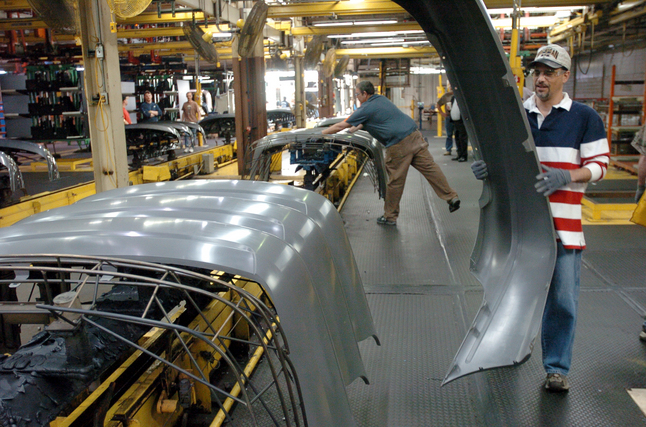MEDC launches new Michigan Advanced Technician Training Program to train next generation of manufacturers

Workers at the Milan Automotive Components Holdings LLC plant in Milan (now Inergy) take "mules" off the line where bumper covers are made. The MEDC hopes its new program will encourage a new generation to embrace manufacturing as a career.
Robert Chase | Ann Arbor News
MEDC vice president Amy Cell said that manufacturing jobs have been stigmatized as dirty or unreliable since the economic downturn. The new Michigan Advanced Technician Training Program aims to combat those stereotypes by offering a work-study program that harnesses companies' need for new manufacturing talent to fund interested students’ education.
“It’s based on a German model of dual education and employer commitment,” Cell explained.
“… A student applies for the program and then they interview with a potential employer. Once they’re accepted and ‘hired’ they begin a three-year program where they will be paid to both go to school and work.”
The students alternate six-week periods in which they work at the manufacturing centers and go to school at either Henry Ford Community College or Oakland Community College. During their work periods they are paid hourly starting at $18,000 per year and increasing each year.
The company pays for the students' education costs and they are also provided with a stipend during the weeks they’re in school.
The pilot program will begin taking applicants through its website on Monday, Jan. 7 and is open to any high school senior in the state. The MEDC hopes to expand the curriculum to community colleges across the state as more employers sign on to participate.
The program currently has room for 30 students at six Southeast Michigan companies. Students who complete the program have a two year "buyback" period working for the company after they graduate from the program with an associate degree.
Ben Freed covers business for AnnArbor.com. You can sign up here to receive Business Review updates every week. Reach out to Ben at 734-623-2528 or email him at benfreed@annarbor.com. Follow him on twitter @BFreedinA2


Comments
Mick52
Mon, Jan 7, 2013 : 9:12 p.m.
I hope they aren't training people so they can go get a manufacturing job in another state where the manufacturers are opening factories. Any tax money spent on this needs to be paired with companies opening factories.
Veracity
Tue, Jan 8, 2013 : 7:41 a.m.
Ann English, You miss the point entirely and this has nothing to do with right to work.
Ann English
Tue, Jan 8, 2013 : 12:33 a.m.
Tax money spent on this? With Right to Work here, tax money would be better spent on this than wasted by public sector unions for their own selfish power. I know, other states have been right-to-work longer than Michigan has, but hopefully our freedom from forced unionism will enable us to adjust as readily to good change as other states and their companies.
st.julian
Mon, Jan 7, 2013 : 5:39 p.m.
This sort of system is necessary if industry wants properly trained and experienced personnel. It used to be called apprenticeship. Industry has the knowledge, tools, and foresight to know when tools and skills need to be reshaped or redirected. Government may but doesn't have the financial capability or technical capability to adjust to changing times rapidly
Veracity
Mon, Jan 7, 2013 : 1:45 p.m.
The program is commendable but it may be impractical. Participating manufacturers will be paying salaries (or stipends) to employees while they are being non-productive as students. Also, the manufacturers must provide employment in lesser skilled jobs until each participant has completed training. However, companies who are experiencing a shortage in employees with special skills which can be acquired through this training program may ultimately benefit. Can MEDC estimate the number of unemployed and high school graduates who could be involved in this program? Also, like mr_annarbor who commented above, I wonder how many manufacturers want to participate in this training-for-employment opportunity at this time. Any names or is this still in the dream stage?
mr_annarbor
Mon, Jan 7, 2013 : 12:28 p.m.
This article fails to mention any which, if any, manufacturers are taking part in this program.